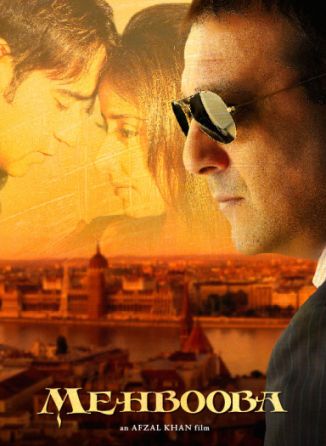
 |
 He’s the only one making a comeback this season and he’s Ismail Darbar! Thankfully, the music composer, who has been sidelined and ignored by the industry, sticks to what he knows and does best – incorporating melody skillfully into songs with a huge orchestral sound. Beautifying the songs are the lyrics penned by Late Anand Bakshi, whose poetry is immortal. He’s the only one making a comeback this season and he’s Ismail Darbar! Thankfully, the music composer, who has been sidelined and ignored by the industry, sticks to what he knows and does best – incorporating melody skillfully into songs with a huge orchestral sound. Beautifying the songs are the lyrics penned by Late Anand Bakshi, whose poetry is immortal.
Tu Meri Mehbooba is an in-and-out Udit Narayan song, which is straight from the 90’s. The combined musical instruments and the magnificent sounds of the orchestra, which is mastered by Darbar, renders it highly enjoyable. While the flute predominates among the instruments used, the different variations in the first and second’s row orchestra accentuate the singing by the dependable Udit Narayan. A female voice make a short appearance in the second interlude, in a very South Indian mode, but is not credited! ‘Tu Meri Mehbooba’ is 90’s melody at its best. Khwabon Ki Rani Hai opens up with a long prelude, familiar with the so many catchy preludes composed by Anu Malik in the 90’s, with both the male and female choruses making a full impact, before Udit Narayan makes his appearance. The track is a mish-mash of sounds from Jatin Lalit and Anu Malik, but Darbar maintains his style with the orchestration, the chorus and the playing of the flute. With an outstanding outro and a classical alaap in the second interlude, ‘Khwabon Ki Rani Hai’ is one of the highlight of the soundtrack as it amalgamates all the best from the 90’s in one song. Kuchh Kar Lo (I) brings Shankar Mahadevan and Kavita Krishnamurthy together in a slow-paced number with heavy percussions. Shankar Mahadevan contributes mostly to the track with his classical alaaps from start to finish, while Kavita Krishnamurthy only sings a few lines. The chorus is extensively used throughout. The first version of ‘Kuchh Kar Lo’ is situational and relies on the classical alaaps more than anything else. Kuchh Kar Lo (II) is shorter with Sonu Nigam making a small appearance, as the male and female choruses are again used in a broad manner. The orchestration is vivid and it also creates a haunting feel at places. Kuchh Kar Lo (III) belongs to Kavita Krishnamurthy, although she is heard after a quite a lengthy prelude. The range of musical instruments used is long and they all blend meticulously into the song. The tabla and the flute take the lion’s share in dominance over the other instruments and the high use of the chorus is also noticed. Kavita Krishnamurthy’s truly matured voice is given less emphasis, as there is more music playing than singing. The track ends on a high-pitched singing.
Achchha To Abb Main Chalta Hoon is a fast-paced number which is high on beats. Sonu Nigam who was once popular for these peppy numbers, does not seem at ease in this one. With out-dated arrangements and a poor tune, it clearly shows that this is not Darbar's domain. Dilruba is less interesting and is also of lower standard compared to the other songs in the soundtrack. Reminiscent of Anand-Milind's numbers, Udit Narayan sounds similar to his songs in Anari. Yaar Tera Shukriya works only for the nice high-pitched ‘antaras’ as the familiar duet of Udit Narayan and Alka Yagnik, does not offer much in this another routine track of the 90’s. The flute marks a return while other instruments such as the tabla and the sitar are also heard. ‘Yaar Tera Shukriya’ is a common Bollywood track – which surprisingly the talented Darbar has managed to compose. Deewana is a nine minute qawalli with Sukhwinder Singh, Sonu Nigam and Aslam Sabri – in an energetic state, where the high-pitched singing is a requirement. The track also scores for the use of the harmonium and tabla. Its simplistic flow is a strong point. The soundtrack of Mehbooba works for a plethora of reasons such as the sincerity in the lyrics of the Late Anand Bakshi, the great use of both the male and female choruses and the fantastic endings.The flute, which is rarely heard these days, is rightfully placed in the songs, creating a smoothing effect at places. Obviously, the recording was done a long time ago, but pure Indian melody always wins, especially when treated with a full orchestra, and accompanied by trained and professional voices such as Udit Narayan, Alka Yagnik, Sonu Nigam and Sukhwinder Singh. Ismail Darbar exhibits that he can compose simple melodies and this soundtrack attests that he has the ability to contribute to commercial movies. However, the composer likes to have this pedantic touch with the orchestra and there is also this fascination with Kavita Krishnamurthy’s voice. Music directors who have ruled the 90’s have also done to death songs such as 'Tu Meri Mehbooba' and 'Khwabon Ki Rani Hai' during their prime time. As such, these tracks do not contain any novelty value. Since these songs are less-heard today, they still bring back the memories of a past era. A recommended soundtrack as ironically, it releases at a suitable time and may have been hit by competition of same sounds, if it was released when it was conceptualized!
|
| Comments | Contact Us | Advertise | Terms of Service | Privacy Policy |